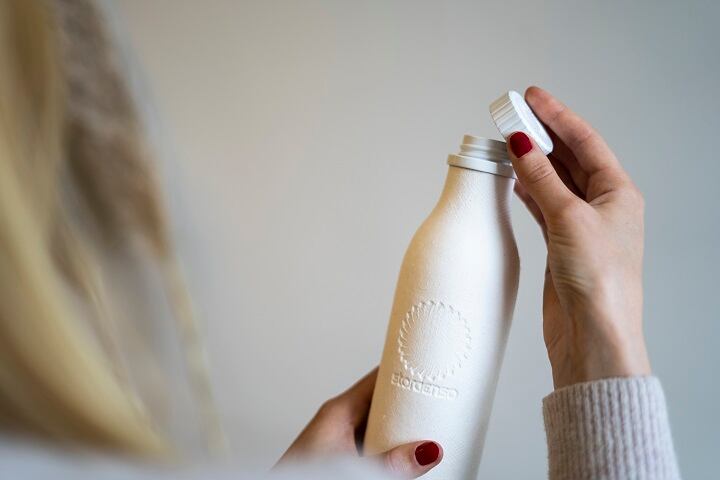Formed fiber is renewable, recyclable and biodegradable: and can be used to replace plastics in a wide range of applications. It is currently used in food packaging such as bowls, trays and lids: but is also being used for the development of fiber bottles.
Stora Enso is investing €8m ($9m) to double production capacity of formed fiber in Europe: doubling its annual formed fiber capacity from 50 to around 115 million units of product, making it one of Europe’s leading suppliers of formed fiber.
From development to high-scale production
In May last year, Stora Enso and Pulpex, a sustainable packaging tech company established by Diageo, launched a partnership to industrialize the production of eco-friendly paper bottles and contains made from wood fiber pulp.
Pulpex uses proprietary food-grade coatings specifically designed to be compatible with the product the bottle is holding. The application barrier will differ significantly depending on the end-use; but the company avoids use of traditional plastic linings, Sohrab Kazemahvazi, Senior Vice President, Head of Formed Fiber at Stora Enso, told BeverageDaily.
“The development work is ongoing and several common goals [of the partnership] have already been achieved. We are approaching the market in a step wise manner, starting with smaller market tests and then building onwards. During 2022 we expect to have multiple brand owners performing different market tests while we, at the same time, keep maturing the technology towards higher productivity levels and better performance.
“Our target is to start market testing of fiber bottles during 2022 for selected end-use applications. Our full development program is run in close collaboration with Pulpex. Depending on end-use application, we hope to see some products moving towards higher scale production in the coming years.”
Rapid development over next five years
Paper bottles are not yet in commercial production but the products are under development, and industrializing them includes a set of challenges.
Formed fiber products are manufactured from various chemical pulps and chemi-thermomechanical pulp (CTMP) by pressing it into a desired shape in a molding machine. The raw material is pulp made from wood from sustainable sources in Sweden and Finland. Stora Enso will manufacture the raw material at its mills in Sweden and Finland and do the converting at Hylte site. Along with the investment, Stora Enso will recruit more than ten employees for formed fiber production in Sweden.
In some cases, formed fiber can have a 75% lower CO2 footprint compared to alternative packaging materials such as plastic or bagasse: although for fiber bottles a Life Cycle Analysis is done by each brand in the context of the product’s complete lifecycle (from manufacture to distribution).
“To simplify, the two main challenges in achieving mass production are 1) Process efficiency & productivity and 2) Barrier performance versus sustainability. We have multiple activities on-going in both areas and we foresee rapid development over the next 5 years,” said Kazemahvazi.
“Fiber bottles as such are complex in the way that different end-uses have significantly different requirements on the bottle (shape, barrier, logistics, filling etc).
"As an example, a carbonated soft drinks require completely different packaging compared to a household detergent in powder form.
"Therefore, we also foresee a step-wise implementation into different end-use segments as process efficiency, productivity and barrier performance keep improving.”

